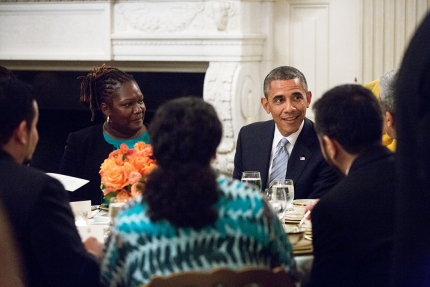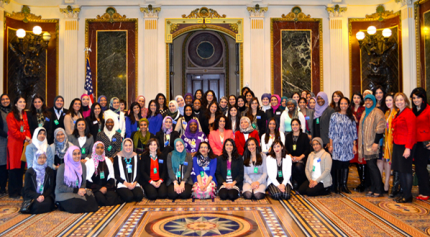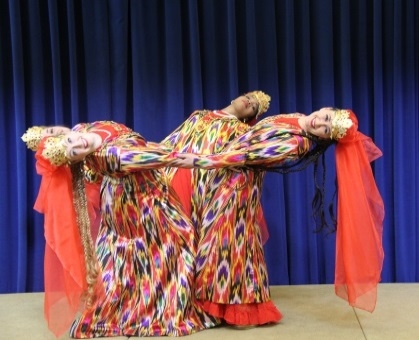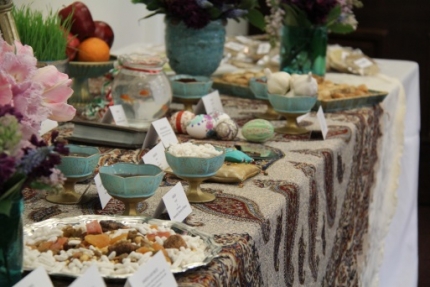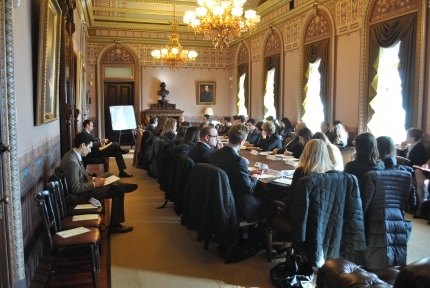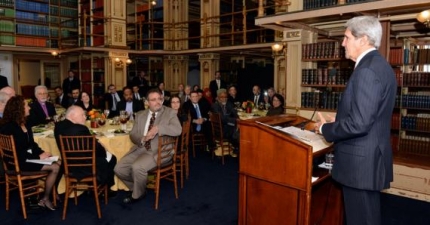Blog Posts Related to the Arab American Community
Five Things to Know About How President Obama’s Executive Action Impacts Undocumented Immigrants
Posted by on November 26, 2014 at 2:32 PM EDTLast week, the President took action to fix as much of our broken immigration system as possible within the scope of his existing legal authority. The President’s Immigration Accountability Executive Actions are an important step to fix our broken immigration system. Millions of undocumented immigrants who live in the shadows want to play by the rules, pay their fair share of taxes, and get right with the law. The President is taking action to fix as much of the problem as he can, while continuing to work with Congress to pass a comprehensive, bipartisan immigration reform bill.
The President has been clear that he can’t fix the immigration system entirely on his own; whatever action he takes will not be a substitute for long-lasting solutions that only comprehensive immigration legislation can provide.
Here are the five things that you should know about the President’s initiatives impacting undocumented immigrants in the United States.
Learn more about , ImmigrationPresident Obama Hosts Iftar Dinner at the White House
Posted by on July 15, 2014 at 6:12 PM EDTEd. note: This is cross-posted on the White House Blog. See the original post here.
Last night, President Obama hosted his sixth Iftar dinner celebrating Ramadan at the White House, an annual tradition started by First Lady Hillary Clinton when she hosted a Ramadan Eid celebration dinner in 1996. Many consider President Thomas Jefferson to be the first President to host an Iftar dinner, as he hosted a sunset dinner to accommodate the fasts of an envoy from Tunisia over 200 years ago.
The Iftar is the meal after sunset that concludes the day of fasting during the month of Ramadan, a time to pray and reflect, to be reminded that we are equals in humanity, and to reaffirm commitments to helping the less fortunate, including those struggling from economic hardship and inequality.
Last night, guests were welcomed into the East Wing where a copy of the Quran owned by President Thomas Jefferson, one of the founding fathers of the United States, was on display from the Library of Congress. At sunset, guests gathered in the Grand Foyer to break their fast with a date following the traditional melodic Muslim call to prayer led by a local student from the University of Maryland. Then finally, after a 16-hour day of fasting since sunrise, guests gathered in the State Dining Room for a halal meal with the President.
Learn more aboutMuslim Women Emerging Leaders: Rising Beyond the Ceiling
Posted by on April 18, 2014 at 4:06 PM EDT“As we honor the many women who have shaped our history, let us also celebrate those who make progress in our time.” – President Obama, Women's History Month Proclamation 2014
In celebration of Women’s History Month, the Office of Public Engagement organized and hosted a Muslim women emerging leaders event at the White House. The event brought together leading Muslim American women and aspiring young Muslim women to celebrate their aspirations and honor their contributions to our nation to bring progress in our time; hear directly from Administration officials about policies and programs affecting women; and discuss ways to rise beyond the ceiling and become leaders in government, media, business, and STEM (science, technology, engineering, mathematics).
More than 80 women from various states and local universities and high schools participated in the event and had the opportunity to share their experiences and hear from Administration staffers and other leaders in the community.
Key speakers included former Secretary of State Hillary Clinton’s Chief of Staff Huma Abedin, U.S. Special Envoy to the Organization of Islamic Cooperation Rashad Hussain, Deputy Director of the White House Council on Women and Girls Avra Siegel, and outreach liaison to Muslim American communities for the White House Office of Public Engagement Rumana Ahmed, who all shared their perspectives on women—specifically Muslim women—in leadership across sectors and the role of identity. The main panel was moderated by Hoda Elshishtawy of the Muslim Public Affairs Council, who helped organize this leadership event.
During breakout sessions, participants also heard about opportunities and initiatives from White House staff, including Press Secretary for the First Lady Joanna Rosholm, Press Assistant Monica Lee and Senior Policy Advisor for the Office of Science and Technology Policy, Danielle Carnival.
They also heard from other Muslim women in the field, including former CNN executive Maria Ebrahimji, Raheemah Abdulaleem from the Department of Justice, Reema Dodin from the Hill and Founder & CEO of Invest to Innovate, Kalsoom Lakhani.
Opportunity for all, women’s empowerment and leadership, and equality were all issues that brought these women together and what the President has already moved to act on. Read more about President Obama’s actions here.
Rumana Ahmed leads Arab American and Muslim American outreach and is the Executive Assistant to the Director of the Office of Public Engagement.
SBA Takes Part in Muslim Business Leadership Roundtable
Posted by on April 11, 2014 at 10:47 AM EDTEd. note: This is cross-posted from SBA.govI had the pleasure to recently participate in the White House Business Council’s Roundtable with Muslim American Business Leaders that brought together the business and faith-based community for a dialogue on how to support small businesses that start, grow and create jobs that sustain our nation’s economy.The forum recognized the tremendous contributions of Muslim American entrepreneurs and small business owners. There were nearly 20 business owners in attendance that represented various industries and sectors of small business. The roundtable provided a platform to acquaint business leaders taking part with SBA’s programs and services that are available to assist small businesses.Joining me at the roundtable was SBA’s John Shoraka, Associate Administrator for Government Contracting and Business Development, and Ann Marie Mehlum, Associate Administrator for Capital Access. Other participating agencies included the National Economic Council and the Department of Commerce International Trade Administration.The conversation outlined the progress that SBA has made in supporting entrepreneurs, including minority-owned small businesses, and laid the groundwork for greater collaboration in the coming months with these important community leaders.The SBA was privileged to have a seat at the table to help address the needs of the Muslim American business community. It gave us an opportunity to tell the story of SBA’s mission to counsel and assist businesses, and to strengthen the economy of our nation. We were able to provide information about our key programs they can use to grow their businesses. This includes SBA’s lending programs that work to address gaps in capital, as well as our government contracting programs that help small businesses compete in the federal marketplace.SBA’s Center for Faith-based and Neighborhood Partnerships works to build strong relationships with both secular and faith-based nonprofit organizations to encourage entrepreneurship, support economic growth and promote prosperity for all Americans.We at SBA recognize the important role of all business communities and networks in economic development at the federal level, and that partnerships can provide effective and valuable steps in moving forward to engage and impact communities, especially those that are underserved and economically challenged.We are working to ensure that the nation’s job creators have access to the tools they need to build, grow and strengthen.Sarah Bard is the Director for SBA’s Office of Faith Based: Neighborhood Partnerships.Working on the Frontlines of Humanity
Posted by on April 4, 2014 at 10:31 AM EDT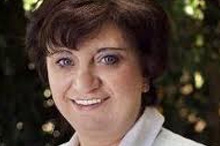
Nahla Kayali is being honored as a Cesar E. Chavez Champion of Change.
Dr. Martin Luther King Jr. said “You only need a heart full of grace. And you can be that servant.” My passion to serve humanity runs through my veins. To serve humanity is not dictated by the color of your skin, the credentials you hold, or the amount of money you make; it’s a blank passport. All you need is love, which is universal. I have dedicated my life to serving my community and working to ensure it has the resources to thrive. Thus, I am honored to be a White House Champion of Change.
It was during my divorce as I was trying to rebuild my life that my story of service begins. During my quest to enroll my daughter in health insurance, I learned about the Children’s Health Insurance Program (CHIP). Concerned for my child’s health, I right away enrolled my daughter in CHIP. I then asked myself—does my community know about CHIP?
I knew my community was underserved and didn’t have access to many resources so I made it my mission to start helping my community and that began with starting a non-profit agency. While my daughter enjoyed story-time at the library, I read piles of books on how to start a non-profit. As a single mom, immigrant, and with no education beyond the 8th grade, I came across challenges that discouraged me from pursuing my dream, but my guidance from Allah and love for humanitarian work reminded me that my destiny is to start an organization to serve my community.
Access California Services (AccessCal), a non-profit community-based culturally and linguistically competent family resource center, came to life in 1998. I received a $2,000 grant from Community Action Partnership of Orange County and worked out of a one-room office using a folding table and telephone I brought from home. I was the organization’s first volunteer. My first task was to outreach and enroll underserved children in CHIP.
Through this program, I learned that the community needed much more than health coverage. I collaborated with the community to implement a needs assessment that surveyed 200 families. Through the assessment, I determined what other services were needed, and with that, our organization grew. Today AccessCal provides 12 programs including health access, mental health, employment services, immigration and citizenship services.
It’s been 15 years since AccessCal was established. AccessCal is my second home. When I walk down the hallways of the organization and see our refugee and immigrant clients crying tears of joy—it becomes my joy. When Khalid got his first job as a lab technician to help him put food on the table for his kids, when Fatima pledged allegiance to the flag and became a registered voter, when Sarah got health coverage to address her cancer diagnosis, when Nasser learned how to speak English to speak to his grandkids, when Mariam and Saeed saved their marriage after receiving counseling, and when Faisal learned to type a resume after taking our computer classes, I was reminded we have the capacity to change lives.
It’s an honor to have AccessCal recognized at the government level. Through grants at the federal, state, county, city, and foundation level and with the in-kind support of volunteers, community members, advocacy organizations, and business owners we are able to continue the work we are doing—which is serving humanity.
Nahla Kayali is the Founder and Executive Director for Access California Services, a non-profit community-based family resource center dedicated to providing Arab-Americans and Muslim-Americans in Southern California with culturally and linguistically competent health and human services.
Nowruz: Welcoming a New Day and the Coming of Spring
Posted by on March 31, 2014 at 10:21 AM EDTAs the President stated in his Nowruz message earlier this month, this holiday is a chance to give gratitude for and reflect on your blessings. “I want to extend my best wishes on this new spring and New Year. As always, this holiday is a chance to give gratitude for your blessings and to reflect on our hopes for the year ahead,” said the President.
Nowruz means “new day” and celebrates the beginning of spring. It represents a time meant for renewal and rejuvenation in preparation for another year. More than 300 million people celebrate this day worldwide.
Recently, the White House Office of Public Engagement was pleased to host its first Nowruz celebration at the White House. We hosted the celebration with guests that represented the many different ethnicities and faiths who celebrate Nowruz across the U.S. and across the world, including Iranians, Afghans, Tajiks, Uzbeks, Iraqis, Azeris and others. Guests included White House and government staffers, local and exchange students, lawyers, business leaders and academic and community leaders.
From traditional dancers to musicians and poetry, to the haft-seen table and Persian food, guests enjoyed a taste of the New Year at the White House Eisenhower Executive Office Building. Event attendees also took part in an East Wing tour and a policy briefing.
Many White House staffers joined the festivities, including Senior Advisor to the President Valerie Jarrett, who delivered remarks. This celebration brought together individuals of various backgrounds as we welcomed spring together.
To a new beginning, a healthy life and prosperous year ahead!
Rumana Ahmed leads Arab American and Muslim American outreach and is the Executive Assistant to the Director of the Office of Public Engagement.
Engaging Community Leaders On the Israeli-Palestinian Negotiations Process
Posted by on February 26, 2014 at 9:46 AM EDTIn the President’s State of the Union address, he stated, “American diplomacy is supporting Israelis and Palestinians as they engage in difficult but necessary talks to end the conflict there.” Secretary Kerry has been at the forefront of these talks and the negotiations process, and the Office of Public Engagement and his Special Envoy for Israeli-Palestinian Negotiations have come together to engage various leaders and discuss the influence and role they can have in this process.
Arab-, Israeli-, Palestinian-, Jewish-, Christian- and Muslim American youth leaders from across the country gathered at the White House for the first time earlier this month to share the work of their organizations and student groups, and to discuss ways to promote and organize efforts in support of the current negotiations process and a two-state solution between Palestine and Israel as difficult conversations currently take place in the region. These young leaders have an imperative place and role to play in this negotiations process and in the future of the conflict as next generation leaders.
Also earlier this year, Secretary Kerry joined a luncheon with Christian, Muslim and Jewish faith leaders at Georgetown university, coordinated by the Office of Public Engagement, State Department’s Office of the Special Envoy for Israeli-Palestinian Negotiations and the new Office of Faith-Based Community Initiatives launched by Secretary Kerry last summer. Imam Yahya Hendi, Cardinal Theodore McCarrick and Rabbi Sharon Brous came together to give opening prayers on the shared responsibility of people of all faiths in the Israeli-Palestinian peace process. Following the prayers from the three clergy, Secretary Kerry discussed current U.S. government efforts in the negotiations process. He also listened to the perspectives, concerns and recommendations of the various prominent faith leaders in the room, and encouraged interfaith and/or faith-based efforts to support peace in the region.
“Humanity once shared an ark, why not again?” – Imam Yahya Hendi
Rumana Ahmed is the Executive Assistant to the Director of Public Engagement.
Crossing the Line in the Sand: Why Early Exposure to Emerging Technologies Will Lead Our Students to Greatness
Posted by on August 12, 2013 at 3:08 PM EDT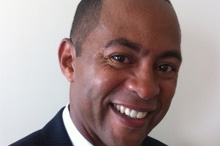
Jeffries Epps is being honored as a Champion of Change for his work to expand opportunities for young learners from communities historically underserved or underrepresented in tech fields.
For the past 21 years I have served the public schools of North Carolina in the area of technology implementation. As a systems engineer and now a technology director, I have worked in both a management and leadership capacity. From my engineering point of view I have witnessed technology change every two to three years. When I became a director I set my cross hairs on the skills we were teaching our students. Working with business leaders, administrators, teachers, and students has afforded me the opportunity to see how our efforts to prepare students directly affect the workplace. It is now my mission to ensure that the technology training inside of the school walls keeps pace with the needs of the global economy.
For two decades, technology in education has evolved rapidly. The rate of change outside of the school walls has not only altered the way we teach our students, but also how early we should expose them to emerging technologies. By exposing them early, and integrating science and mathematics at every grade level, they will have years to master these technologies as opposed to semesters. In addition, most companies will not entertain an engineer’s application unless they have seven verifiable years of exposure to the engineering process. So where can these applicants be found? They are currently in the 3rd grade!
In 1996, we began wiring schools for internet access. Students could access the internet from every classroom, media center, and computer lab. Since then, tools such as word processing, electronic presentations, and desktop publishing have become commonplace in our schools, homes, and the workplace. Students who were 3rd graders in 1996 graduated in 2005, however, they progressed into a workforce that had already been saturated with workers possessing the same skills. During this time, we drew a line in the sand that separated mediocrity and greatness. We sided with mediocrity. Yet, the workforce was demanding more highly-skilled, innovative workers.
Early exposure equips them to compete for current and future jobs, satisfy the seven year requirement and most importantly fail their way forward. When failure occurs, students often side with mediocrity. At this early stage they will learn that failure is a part of success and they persevere toward greatness. Greatness when their first line of code throws them a syntax error. Greatness when their first 3D scan does not align properly. Greatness when their first 3D object does not print as expected. Suddenly greatness is no longer a buzz word; it is now an attitude. This provides upward mobility. 3D technology will continue to evolve and these students will have the necessary knowledge, skill, and attitude to lead us into the future. By the time our 3rd graders graduate, they will be well-equipped to fill these jobs. The key is early exposure!
Somewhere along the way the real world component became someone else’s responsibility. As educators, it is our responsibility to take the time and make the connections between coursework and the real world. When students apply what they have learned to solve real world problems we pull them to the “greatness” side of the line and we dare them to go back!
In education, we stand on a great Genesis. We are redefining ourselves, and the way in which we do things. If we don’t get this right, generations will pay the consequences. If we are to lead the world, we must cast the vision of what the marketplace will be by teaching skills and thought processes that will be relevant well into the future. The end result is a highly skilled workforce that is prepared to compete globally. The United States will maintain its economic edge. Success does not follow mediocrity; success follows hard work and leads to greatness. Let’s start!
Jeffries Epps is the Director of Information Technology for Richmond County Schools in Hamlet, NC.
Learn more about Technology
- 1
- 2
- 3
- 4
- next &rsaquo
